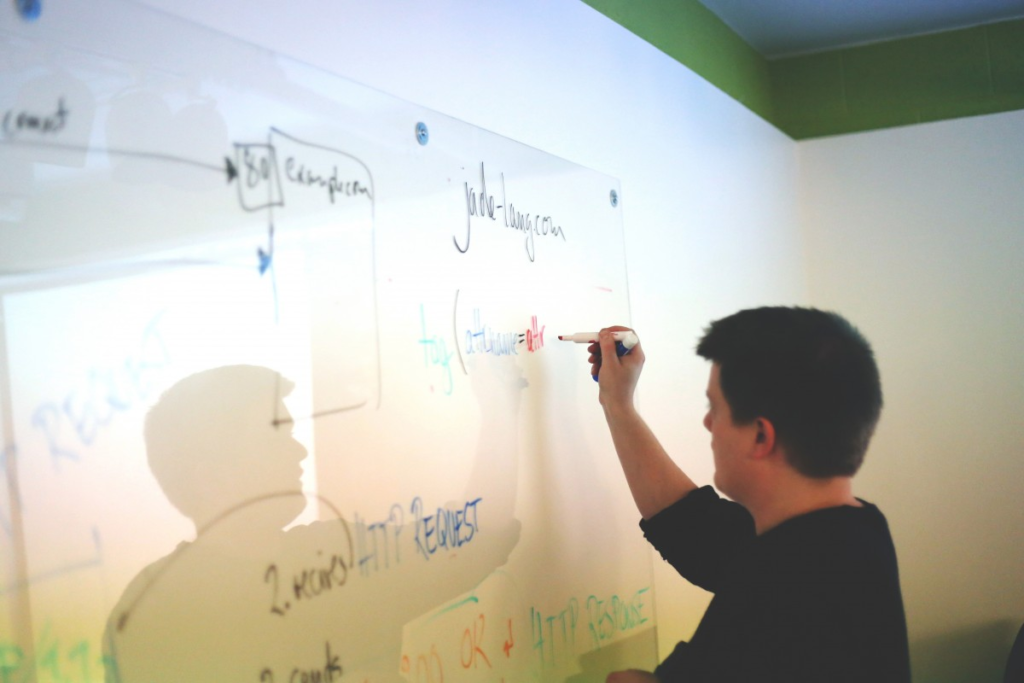
Case interview questions and why you should use them in tech

Several years ago, we discovered one of the most troublesome issues of the IT professional hiring process: it is not very realistic. Luckily, there are numerous interview techniques to help with this, from situational interview questions examples to the ideal personal interview questions 및 coding challenges that can be used on your next candidate. This article will focus on one of a number of technical interviewing strategies you can implement in your recruiting process: the case interview questions.
Case interview questions for tech companies
The case interview was originally a technique focused on assessing candidates for partner-track roles and associate-level employees. However, it has evolved to analyst-level employees who provide internal support to senior management and the research department.
In this article you’ll see:
- What is a case interview?
- Why use case interview questions?
- Types of cases you might see in an interview
- Sample case interview questions
- Case interview scenarios
 Image credit: pxhere
Image credit: pxhere
What is a case interview?
A case interview typically involves presenting a candidate with an authentic business scenario, similar to the one that your firm regularly handles with its clients. During the case interview, an interviewer presents a situation and asks the candidate to explore the underlying causes of the problem. The candidate is then expected to perform an analysis and provide advice on how to handle the scenario. In the IT realm, the candidate may be asked to demonstrate how that advice might be implemented in order to show specialized technical proficiency. So, in brief, the candidate’s task is to:
- ask questions, to help identify the main problems
- develop and present a framework for analysis
- use the framework to offer recommendations or suggestions of advice
The questions or ‘cases’ used in these case interviews are often drawn from the interviewer’s actual project experience. So generally, the interviewer must be suitably experienced, not just in their professional capacity, but also in the ability to host these kinds of interviews. Case interviews typically last from 45 to 60 minutes, with a focus on the case itself for around two-thirds of that period.
 Image credit: pxhere
Image credit: pxhere
Why use case interview questions?
Case interviews are more often used by management consulting firms (increasingly by other organizations too) as part of the selection process. Sometimes the case interview will be the only form of questioning but often they are used in conjunction with another form of technical assessment, i.e coding or situational. They are commonly used one-on-one but can be utilized in groups as part of an assessment center.
Case interview questions test for the ability to translate a problem statement into a working technical solution. A case interview can test not just programming skills but also:
- analytical and logical reasoning ability
- creativity
- numerical and verbal reasoning
- problem-solving ability
- organizational and time management
- the ability to think quickly under pressure
- presentation and communication skills
- confidence, business acumen, and professionalism
An advantage of the case interview is that the correct answer is not as vital as the process the candidate used to reach it. The objective of this type of interview is not to merely produce the right answer, but for the candidate to demonstrate their ability to solve complex problems independently and under pressure. In fact, there is often no ‘right’ answer. The nature of these interviews is generally very interactive, designed for the candidate to ask questions, seek clarification, and bounce ideas back off the interviewer.
Types of case interview questions
There are essentially three types of case interview questions and we will cover them here.
Brainteasers
Brain teasers are sometimes referred to as “back of the envelope” questions in the consultancy field. They are logic questions that are used to gauge a candidate’s problem-solving skills. They are almost always numerically driven and the candidate will be asked to estimate the value, cost, or a number of an everyday item, thing, or commodity.
However, the use of brain teasers is flawed. Even ask Laszlo Bock, former senior VP of people operations at Google. He went on record to say they are “a complete waste of time” and that they “don’t predict anything.” Decontextualization helps. These questions measure how good candidates are at coming up with a clever, plausible-seeming solution to an abstract problem under pressure. However, employees don’t experience this type of pressure on the job.
Imagine being asked how to explain the internet to someone coming out of a 30-year coma. Not very applicable is it?
 Image credit: pxhere
Image credit: pxhere
The “parade of facts” or graphic interpretation
The parade of facts question is one that provides significant detail, some of it irrelevant, that tests the candidate’s ability to distill key issues. This form of questioning requires a depth of analysis based on relevant facts. As these questions are time-consuming, the use of them is relatively rare.
Because of this, firms tend to gravitate towards a graphic or statistical interpretation approach. The scenario might come in the form of an image or a graph, but still includes outlying information, i.e red herrings. This format is often less confusing for the candidate and is a more efficient technique to disperse key information. With this type of questioning, the candidate is required to interpret and review statistical data represented in a chart or graph.
Roleplays
Perhaps the most common form of case interview poses the question in only a few sentences. This leaves the candidates with minimal information and forces them to go several layers deeper by asking relevant questions to understand the key issues. Sometimes this type of interview is referred to as “the great unknown.”
The format is commonly used in a role-play scenario where the candidate is the consultant and the interviewer as the improvised client or manager. The fact this style of interview invites the candidate to formulate their own questions and develop frameworks is attractive to the organization’s using it.
The roleplay method is a great tool for the candidate to display client relationship skills and prove that they enjoy solving problems. Even if the structure of the question isn’t entirely role-play in nature, the question is very much situational and circumstantial. It places the candidate in the role of a consultant and allows them to creatively and critically analyze a real-world (often) business problem.
Tech case interview scenarios
Business situations
These questions are designed to test the level of business knowledge a candidate has and whether they can apply it to authentic business problems.
Several types of common business problems can include (but are not limited to):
- profit and loss
- 조직 구조
- the implementation of new technology
- marketing scenarios
The candidate will likely offer a verbal response to a question of this nature. The interviewer can draw on their own experiences to help guide the candidate through the scenario.
Some examples of a good question:
- A progressive, tech-savvy CEO of a regional hospital chain is concerned that their company’s profitability is half that of the market leader. Using your tech background and business expertise, how can the company grow its net income?
- Describe how you would approach a situation where your current project’s progress is slipping because of a lack of contributions from one of the client’s project team members?
- A multinational manufacturing firm is faced with flat sales and the IT department is under pressure to identify ways to reduce costs. Our team has been tasked with developing a roadmap to achieving cost savings – how should we proceed?
- A very large sports league needs to move their entire datacenter into the cloud in six weeks to support their new mobile video application. What are the first sets of challenges you would expect to face?
Business strategy
A business strategy question might involve an area such as growth, organizational expansion, and multiple operations issues. A complex business strategy question can involve multi-industry, multinational, and market-dependent problems. A more localized scenario is even a possibility, giving the interviewer the freedom to probe your knowledge in a variety of areas.
Common types of business strategy scenarios include:
- advising clients about an acquisition or merger
- responding to a competitive move by another company in the industry
- evaluating opportunities for a new product introduction
A scenario that has been tackled effectively will be from a candidate who sets out a problem-solving framework. So in essence, setting out a plan, formulating the analysis and drawing recommendations from those conclusions.
Some examples of a good question:
- A client is a global financial services firm that is considering allocating more resources to the facilitation of electronic fund transfers globally. The CEO wants you to develop a strategic plan to increase the company’s share of the market.
- A client is a software development investment company attempting to develop a ride-sharing app that uses “green” technology for its driving fleet, resulting in 85% less emissions and being 15% more affordable than its competition. Please help determine the product’s market potential and the strategy to bring it to the market.
- A large retail firm is looking to develop a new digital strategy to better engage customers and improve sales – how should they begin this journey and what factors are most important to keep in mind?
- The third-ranked competitor in the cellular phone services market is at a disadvantage relative to its larger competitors. Providing cellular phone service has high fixed costs – for the equipment that transmits calls, the retail stores that sell phones and the marketing spend that is key to customer retention. The CEO is considering acquiring a smaller competitor in order to gain market share. They would like our help thinking through this decision.
 Image credit: pxhere
Image credit: pxhere
Business operations
Business operations case scenarios are questions that fundamentally relate to the running of the business itself and are more complex than market sizing questions or brainteasers. Interviewers enjoy questions like these because they allow the interviewer to see if the candidate has the ability to comprehend critical issues that pertain to running a business.
Common types of business operations questions include:
- the relationship between revenues and costs
- the relationship and impact of fixed and variable costs on a company’s profitability
Questions pertaining to business operations require the candidate to demonstrate a learned understanding of business processes and an ability to distill key issues from a lengthy amount of information. These scenarios are usually represented by the “parade of facts” case type.
A (lengthy) example of a good question:
- Your client ABC Technology is a large information technology (IT) outsourcing service provider. At the time of its creation, ABC Technology had revenues of $25 billion, 170,000 employees and operated in 70 countries.
The client (ABC) is nearing the end of a long-term contract with its largest customer, Giant Corp. The CEO of Giant Corp. has notified ABC Technology of its intent to “level the playing field” of competition for its IT-related business. The customer Giant Corp. has indicated that 100% of the business ABC Technology currently enjoys will be available for bids by ABC Technology’s competitors.
The client would like your assistance in developing a view of its business with Giant Corp. In addition, ABC Technology believes the trend to structure outsourcing initiatives by standardized service lines will continue, and therefore it views this client opportunity as a “wave of the future” that it will soon see repeated with its other major clients.
Your desired outcome is to develop a high-level engagement approach and to brainstorm what insights are needed to strengthen ABC Technology’s response to the forthcoming bid process. How would you go about it?
Market sizing
Market sizing questions are focused on establishing the size of a market in regards to annual revenue or the number of units sold. They are rather simple in design, and generally do not require the candidate to explain how to successfully compete in the market. These questions are common from consulting firms early in the consulting interview process. They are even more frequent in interviews with undergraduate students who are not so business savvy. Market sizing questions are often represented by a succinct brainteaser such as:
- What is the size of the market for mobile food delivery services in the United States?
- Discuss what is wrong with the following statistic: the Volvo is the safest car on the road because a recent study has shown that Volvos have the fewest number of accident deaths per mile driven.
 Image credit: pxhere
Image credit: pxhere
결론
Although they take their inspiration from a broader field of economic comprehension, case interview questions can be an effective technique to assess IT consultants and professionals alike. Some types and scenarios work better than others according to their content, IT is proof of this.
One of the most interesting aspects of case interviews is that once a question has been posed, there are an infinite number of directions the case can go. This affords the interviewer many angles from which to assess a candidate. It is certain that depending on the role you are hiring for, case interview questions are able to genuinely evaluate your candidate’s creative and critical thinking process. Now that you’re familiar with case interview questions, we wholeheartedly recommend the 45 behavioral questions to use during non-technical interview with developers.
We hope this gives you a solid idea of how case interview questions can be useful to your organization. If you’d like to read more on a related subject, please check out our article on work-sample interviews.




